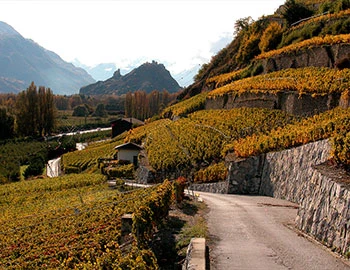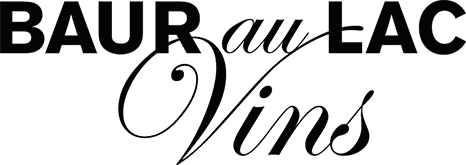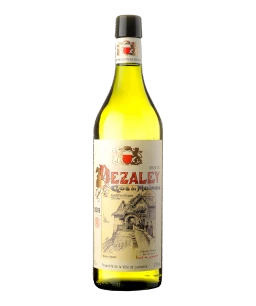
Dézaley Clos des Moines, Gamme historique 2022
AOC Waadt, Ville de Lausanne, 750 ml

| Grape variety: | Chasselas |
| Producer: | Ville de Lausanne |
| Origin: | Switzerland / Waadt / Lavaux |
| Other vintages: |
Description
The city of Lausanne is the proud owner of this steep, slightly higher vineyard site. The wine is sold every year at a public auction. Clos des Moines is spectacularly situated on the steep slopes of the Dézaley appellation in Lavaux. This is the only appellation in Lavaux (along with Calamin) that is allowed to bear the label "Grand Cru". This Chasselas smells of lime blossom, a little pineapple and flint. On the palate, it is complex, aromatic, creamy and has a fine mineral, long finish.
Attributes
| Origin: | Switzerland / Waadt / Lavaux |
| Grape variety: | Chasselas |
| Ripening potential: | 1 to 6 years after harvest |
| Drinking temperature: | 10 to 12 °C |
| Food Pairing: | Apéro pastries, Fresh water fish with cream sauce, Cheese board |
| Vinification: | fermentation in steel tank, pressed carefully and immediately, fermentation at low temperatures |
| Harvest: | hand-picking, strict selection |
| Maturation: | in steel tank |
| Maturation duration: | 10 months |
| Volume: | 13.0 % |
| Note: | Contains sulphites |
Chasselas
Swiss pride
From cheerful drinking wine to the classy grand cru: the Chasselas is, with good reason, the flagship of Switzerland. It is extremely multifaceted. A young, apple and pear fruit specimen turns raclette into a feast. And a mature plant from the steep slopes of Lake Geneva, for instance from Lavaux, perfectly accompanies fish and seafood with its nut and flint notes. In its stronghold, the canton of Vaud, the Chasselas was once called Fendant. It has been known there for over 500 years. But at the beginning of the 20th century, vintners renamed it Chasselas, and from then on wrote the communities of origin on the label. Meanwhile, the grapes gathered such a reputation in neighbouring Valais as Fendant that most people today believe the name was invented there. The difference between the regions is that in Vaud the terroir expression of Chasselas is particularly noticeable. In Valais, conversely, the warm weather allows particularly round, fruity wines to develop. The Chasselas from Neuchâtel is not to be forgotten. A specialty there is the non-filtré, an unfiltered wine which is enjoyed in January as an early harbinger of spring.
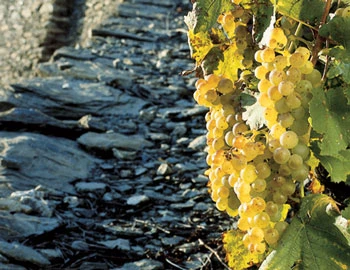
Lavaux
The Lavaux: In the stronghold of Chasselas
The Lavaux comprise 825 of the 3,800 total hectares in Vaud, and form the heart of viticulture in this wine-growing canton. In the sometimes spectacularly steep terraced vineyards, the Chasselas grape demonstrates that it can produce tightly structured crus shaped by the terroir. The wines from the 54-hectare grand cru site, Dézaley, have a legendary reputation. More delicate wines are produced in the western parts of the Lavaux (Lutry and Villette) and the eastern foothills (Montreux).
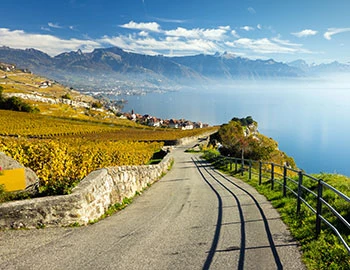
Waadt
Vaud: stronghold of the Chasselas
Vintners of Vaud have almost stubbornly maintained their loyalty to their preferred variety, Chasselas. This is now paying off, as white wines with moderate alcohol content are experiencing a renaissance. And vintners today interpret the lightness of Chasselas in their own individual ways. Over 100 chateaux produce wine here. By contrast, the wine villages fascinate with rural charm. It is these contrasts that make this winegrowing canton an exciting destination for wine tourism.
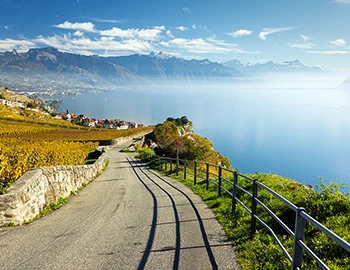
Switzerland
Switzerland – A small country with enormous diversity
Switzerland is famous for its banks, watches, and cheese, but not necessarily for its wine. The Swiss didn't invent wine, but they have been extremely open and curious to it. Wine culture arrived in what is now modern Switzerland via several routes: from Marseilles to Lake Geneva and the Lower Valais region; from the Aosta Valley through the Great St. Bernard Pass to the rest of Valais; from the Rhone through Burgundy, across the Jura Mountains to Lake Constance; and from Lombardy to Ticino, and then on to Grisons.
